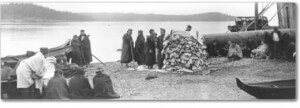If you are ever invited to a Potlach Ceremony, forget about bringing a gift for the host.
Just bring a large bag to carry home the gifts you are given. It has been said that it is greater to give than to receive, and for Canadian west-coast Indians, the potlach was the ultimate expression of that. In a tradition, which has contradictory origins, the potlach entailed an inspiring chief holding a party in which he gave away most, if not all, of his worldly gifts. In exchange for this largess, the chief-in-waiting received adoration and the affection of his guests.

It is said the tradition of the potlach ceremony began with the giving of feathers, a sacred item for most west-coast Indians. However over time the ceremonies took on more elaborate gift-giving themes.
The word potlatch comes from Nootka, a Wakashan language spoken nowadays by about six hundred people in western British Columbia and Vancouver Island. The Nootka word for gift was patshatl. Potlach was first used in English in a Puget Sound document from 1865, wherein the following description was found:
“There was going to be a great potlach at the coal-mines, where a large quantity of iktas [goods] would be given away–tin pans, guns, blankets, canoes, and money. It seems that anyone who aspires to be a chief must first give a potlach to his tribe.”
Potlach was make illegal in Canada in 1885, at the urgings of missionaries who declared the practice as wasteful and not part of civilized values (I can only guess that they missed that “blessed” part in their bibles.) One missionary, William Duncan wrote in 1875 that the potlatch was “by far the most formidable of all obstacles in the way of Indians becoming Christians, or even civilized.
In 1885, the Indian Act was amended to include:
“Every Indian or other person who engages in or assists in celebrating the Indian festival known as the “Potlatch” or the Indian dance known as the “Tamanawas” is guilty of a misdemeanor, and shall be liable to imprisonment for a term not more than six nor less than two months in a jail or other place of confinement; and, any Indian or other person who encourages, either directly or indirectly an Indian or Indians to get up such a festival or dance, or to celebrate the same, or who shall assist in the celebration of same is guilty of a like offence, and shall be liable to the same punishment.”
The banning was also seen as part of the attempt to assimilate the Indians, but it did not work. The prohibition on potlach simply drove the ceremony underground.
The potlach was made legal again in 1951 when prohibition was removed from the Indian Act. To this day the ceremonies take place frequently.
Leave a Reply